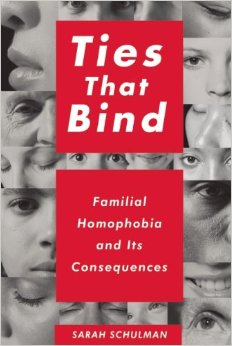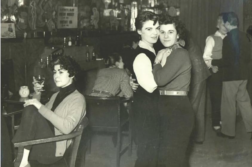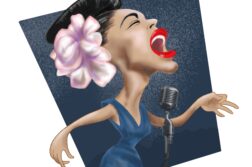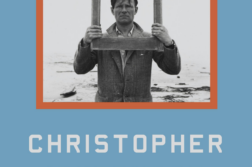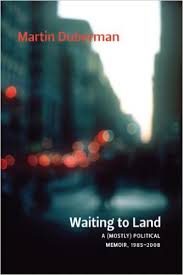 Waiting to Land: A (Mostly) Political Memoir, 1985-2008
Waiting to Land: A (Mostly) Political Memoir, 1985-2008
by Martin Duberman
The New Press. 352 pages, $26.95
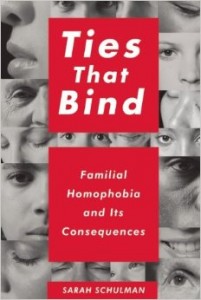 Ties That Bind: Familial Homophobia and Its Consequences
Ties That Bind: Familial Homophobia and Its Consequences
by Sarah Schulman
The New Press. 192 pages, $23.95
TWO NEW BOOKS by longstanding gay community activists and political essayists Martin Duberman and Sarah Schulman are useful if not indispensable for addressing big problems and painful if still-unconscious contradictions impacting our movement nowadays. It seems we’ve made momentous progress in civil rights—five states allow same-sex marriage—and even consciousness raising, but we still seem so regressive socially and personally in basic ways. I am looking at these two works through the lens of my work as founder and director of the LGBT Specialization in Clinical Psychology at Antioch University Los Angeles over the last five years, and as a gay man, activist, and psychotherapist.
Duberman’s book provides a necessary diagnosis of our problem, politically speaking: deprive a people their history and you deprive them of their “souls,” a word he uses, albeit in a slightly different context, despite his avowed loyalty to the materialist school of social constructionism. Duberman is our community’s main historian—and one of our most important activists. He was involved in creating the still successful Center for Lesbian and Gay Studies (CLAGS) at the CUNY Graduate School thirty years ago, the first university-based research center of its kind in the United States, which spawned other such academic programs around the country, including the one I’m involved in.
Besides his foundational books on GLBT history (Stonewall; Hidden From History; Reclaiming the Gay and Lesbian Past; About Tim) and editor of numerous volumes, he is especially loved for his confessional, sociological memoirs à la Rousseau (without the narcissism). His first book, Cures, described his life through the year 1970 and focused on the psychoanalytic treatment he had received to “cure” his homosexuality. His second autobiographical work, Midlife Queer, focused on the decade of the 70’s. Waiting to Land, as he puts it, carries the “story up to the present day” and “addresses issues that had not arisen prior to 1980 (AIDS, say), including the now-solidified disillusion among gay left-wingers with the national GLBT organizations.”
Reminiscent of Duberman’s earlier work, there are some juicy tidbits here, such as how obstructionist the historian John Boswell could be, and the nastiness of the infighting during the founding of the gay studies program at CUNY. But unlik his other memoirs, this book is meant to be less revelatory about Duberman’s personal life and more focused on clarifying the relative value of some of the dominant political narratives impacting the vicissitudes of gay liberation as we know it, notably: the AIDS epidemic, act-up, the Reagan–Bush–Clinton debacles, gay male sexism, racism, looksism. Of these threads, I appreciate two main ones: First, what happened to the gay political left that spawned the gay liberation movement? And second, why do so many members of the scholarly wing of the gay movement believe that gay identity is a social construction rather than an essential characteristic? (There is a third which is also quite interesting: why does the American Left remain so homophobic?)
Duberman is at his strongest when highlighting the substantive differences between the gay political left and the gay “mainstream,” which he labels as “conservative”: “The gradual evolution of the once radical gay movement of the early seventies into a more narrow conformity with mainstream values is part and parcel of the natural history of social justice.” He doesn’t like this historical process: “the majority of gay men still strive to appear not as supermen but as ‘normal’ men—assimilation, not the assertion of differentness, is the goal of both individuals and most of the national gay political organizations.” It vexes him that these gays are being “welcomed into the American mainstream in mounting numbers” and that the “armed guards at the gate … prevent admission to overweight butch dykes, foul-mouth black queers, dickless ‘men’ and surgically created ‘women’ delusionally convinced that they’re part of some nonexistent group called the ‘transgendered.’ To those, in other words, who do assert and display their differentness.”
His gay leftism is hard-won. It is a rarefied form of consciousness, and it sees through lies and deceptions, and we can’t progress without this moral compass. And yet, as he points out, as our movement moves rightward, it forgets or forsakes its essential socialist, Marxist, feminist, black power, sex-positive principles—among them, that being gay means being a revolutionary, that it’s better to be different than the same, that to be gay means to fight for the rights of everyone, that we cannot sit at the table if we’re not including others who are not invited.
Another important thread is Duberman’s interest in clarifying the debate between social constructionism and essentialism. Duberman believes that, because there are fluid and bisexual people, gay identity is a manufacture of social forces and life’s vicissitudes rather than a universal or transhistorical phenomenon. He illustrates his longstanding debate with reference to Larry Kramer, who has attacked Duberman for denying that some ancient people were gay in our sense. Duberman also highlights, rather ironically, his discussion with Gore Vidal, whose distaste for his own love impulses are off the charts. (Vidal has always refused to call himself gay.) Duberman is a proud gay man but worries that identity politics are ephemeral: “The emphasis on establishing an identity may be necessary in forming a political movement—but comes at the expense of fluidity, a self-conception once preferred.” At times Duberman seems ambivalent about the worst excesses of postmodernism. Of Moniq Wittig’s work he says: “the excerpts read in English from the podium of an untranslated work came across to my tired ears as precisely the kind of abstracted, ‘philosophical’ prose I find repellent and grandiose.” He also kvetches when his so-called “brilliant” postmodern students give him shit for wanting to talk about “love” and “intimacy,” and malign him with a word meant to tar and feather any self-respecting intellectual: “humanist.”
Sarah Schulman manages to sidestep the “nature–nurture debate” by conceding, in effect, that of course there are constructions and of course there are essences—why not both? And let’s start with the essence, because otherwise what drives us to realize that we’re gay? Writes Schulman: “The capacity for feeling, strong enough to overwhelm social expectation, is at the root of the homosexual identity.” In Schulman’s world, gayness exists as clear as day—and so does homophobia. She doesn’t see the problem merely as social discourse or grand narratives of unjust power; that would be a cop-out. She lays the blame for our suffering squarely on our families and their forced participation in a type of violence that is neither natural nor just. She goes so far as to imagine how a functional family would treat its gay children: “They discuss as a family their special responsibility to protect their daughter/sister/mother/ niece/aunt/cousin from pressures and cruelties that they themselves will never face. They promise not to exploit or enjoy privileges that she is denied, and to commit their family’s resources to accessing those privileges for her and other gay people.” In prose that’s both logical and fiery, she cites familial homophobia as our major political problem deserving at least as strong an intervention as anything ACT-UP ever fought. She sees this problem as both material and psychological: “The specifics and dimensions of familial homophobia are broad and vast. They can range from short-sighted slights to varying degrees of exclusion to brutal attacks that distort the gay person’s life to direct and indirect cruelties that literally end that person’s life.”
Like Duberman, Schulman is outraged at how society can remain so barbaric and hateful to us as human beings. She argues that intervention on a grand and comprehensive scale is necessary: “Without compassionate intervention, however, familial homophobia can become an overwhelming wrenching determinate on the gay person’s life.” She encourages all kinds of interventions, public confrontations, and the like. She offers many aphorisms that feel good for the soul. Here is one: “In order for us to come to a cultural agreement that homophobia within the family is wrong, we need one basic shared assumption: homophobia is not the fault of gay people. There is nothing a gay person can ever do to justify it. Homophobia is a pathological manifestation of heterosexual culture.”
Schulman details the ways in which “false accusations” from heterosexuals about how bad gay people are (e.g., we can’t raise children) operate as an “anti-social condition that causes violence and destroys families.” Many tools are used for enforcement, but the most pernicious is the practice of “shunning, the most common form of homophobia and the easiest to carry out,” because it is a passive system of exclusion from the family, from the straight world, or from a lover’s straight friends. Shunning enacts a form of harassment that’s as invisible as it is “multiplicative,” and can lead gay people to feel crazy and alone, so much so that the subcultures we have made for ourselves and even our romantic relationships can become an instrument of the larger structures of cruelty (e.g., gay and lesbian domestic violence) when there’s no accountability and no one to be accountable for. Schulman’s aim is to “open up a new category of thought” and finally to acknowledge that homophobia operates as a “pleasure system” in which “homophobes enjoy feeling superior, rely on the pleasure of enacting their superiority,” and that there’s a type of sadistic “fun” in being homophobic.
Both Duberman and Schulman agree that as things are getting better for us in some respects (more marriages), they’re getting worse in other ways (more murders, more insidious forms of homophobia; less historical memory among gay people; less rootedness). This contradiction is maddening if not suicidal and genocidal. If we put Duberman together with Schulman, we have a preliminary working prescription for an immediate change of course. Without a deep appreciation of historical processes, a people cannot feel themselves to be whole—this is what Duberman provides. But we must also go one step further. While Schulman does not say we should become “psychological,” perhaps due to her own experiences of homophobia in therapy, her call for social change is nothing but a psychic one: we have to make homophobia inside ourselves and our body politic our main social justice agenda if we are to stave off irrelevance as a people and realize what Duberman dares to call our “potential” in being gay. I dare us, as our two main gay lefties do, to act up now.


